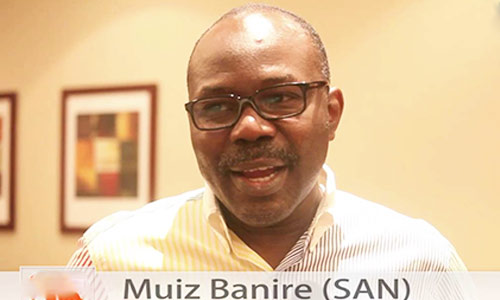By Muiz Banire, SAN
One area of the economy in Nigeria that has been worrisome for ages now is the petroleum industry. Like any other Nigerian, one is worried about the state of our petroleum products pricing. For years, the petroleum sector became the barometer to guage how much an average Nigeria was suffering as there was perennial shortage of supply of petroleum products to local consumers, thereby necessitating long queues at petrol stations. This was often the case any time there were agitations that there would be increase in the pump price of petroleum products. In some of my write ups in the past, I have unapologetically joined the advocates of the complete deregulation of the petroleum sector.
Two main reasons account for my position: there is the need to eliminate subsidy in the sector as it has become a drainpipe of the nation’s resources and, secondly, to enable appropriate pricing of the products. In this advocacy, I am not oblivious of the potential hardship it would engender on the masses but I have suggested palliatives that will neutralise the impact. For example, I have contended that half of the savings from the eliminated subsidy be redistributed by way of addition to workers’ emoluments while the other half be applied to the provision of infrastructure that will positively impact on the way of life of the masses. Regrettably, this has not happened.
One is not oblivious of the fact that increase in the emolument of workers has a tendency to jerk up the inflationary situation in the country. It is apparent that consistent increase in the prices of petroleum products without necessary cushion on the effects this has on the workers and masses generally may lead to an uprising just like what was experienced in January 2012. Unfortunately, the various governments have used the issue of subsidy and the need to remove same as points of campaign so that the people are tired of listening to subsidy arguments anymore.
Since 1986, the various regimes have kept on removing subsidy on petroleum products and it seems that this subsidy always re-appears each time it is removed by way of increase in the prices of the products. Just last week, there was an attempt to further increase the price of petrol by the Petroleum Products Pricing and Regulatory Agency (PPPRA).
This effort was eventually thwarted by the Ministry of Petroleum through an overriding order. Notwithstanding this temporary reprieve, the truth is that the increment will continue as the current administration that led the stuggle against the continuous payment of subsidy to marketers seems to have caved in on the struggle and has increased prices of petroleum products more than twice since it came to power in 2015. It is apparent that there will be an increase, no matter what Nigerians do. From the suggestion of the agency, this is necessitated by the increase in the price of crude oil in the international market, a thing of joy to Nigeria. While the logic, therefore, in the corresponding increase of prices of refined products at the local level is appreciated, my challenge with the whole process of importing refined products is the exclusivity self-conferred by the Nigerian National Petroleum Corporation (NNPC).
It is a sad epitaph on our collective underdevelopment that, since the 1980s, Nigeria has been importing refined products from countries like Venezuela; this process has not abated till date, more than 30 years after. It is not surprising, since the refineries in Nigeria have gone moribund, notwithstanding the huge expenses incurred every year on their turnaround maintenance. It does seem the refineries in Nigeria are white elephants that may never come back to life.
Thank God, however, for Dangote; but I understand that most of the products might end up being exported as contracted. On the 17th day of March 2021, the Minister of State (Petroleum), Timipre Sylva, was reported to have said at the 56th Annual International Conference and Exhibition of the Nigeria Mining and Geoscience Society (NMGS) in Ibadan, Oyo State, that there would still be an increase in the pump price of petrol. There is speculation that it would be increased from N162 to N206. While this is much expected as the administration has never shied away from its inability to redeem the promise that petrol scarcity would be a thing of the past and the price of petrol would come down to pre-2011, it is clear that there is a challenge that has not been addressed, which is the causal factor of this crisis. The issue, as I have said earlier, is the monopoly enjoyed by the NNPC in importing refined petroleum products into the country while average marketers are at the mercy of the NNPC. Why should it be the corporation alone importing petroleum products on behalf of all marketers in a regime of deregulation? Without doubt, we all know that in any monopoly a lot of sharp practices occur. Basically, the regulator who is supposed to monitor the quality is the same one that now procures it.
What stops the corporation from endangering all Nigerians with poor products by way of compromise, since there are no checks and balances? What stops the corporation from exploitative tendencies, which is suspected to have been happening? How do we ascertain the costs generally associated with all the processes leading to the delivery of the products? What, therefore, is wrong with allowing various marketers to import directly, in line with the deregulation policy?
The role of the regulator ought to be that of monitoring the quality of products in the circumstances canvassed. The minister was reported to have promised that there would be full deregulation now and government is only working on providing alternatives to Nigerians by tolling some roads. The federal government has also promised that alternative and cheaper sources of energy, which I fail to understand, will be provided for Nigerians. I am of the opinion that the monopoly enjoyed by the NNPC cannot continue and anyone would be talking of full deregulation.
Where there is full deregulation, average marketers would not be subjected to this kind of control and we expect them to comply with government regulations of sales at particular prices without resistance. Government has argued that the landing cost of petrol is N202, which is fuelling the speculation that there will be increase up to N206. This is a reasonable conclusion, anyway, as no one expects the pump price to be lower than what the government is claiming to be the landing cost to justify its threatened increase in the pump price. The monopoly must be broken. Except this is done, Nigerians will continue to have the impression of some people profit from the sole importation, a fact not far-fetched. Nigerians would probably have been indifferent to this seeming scam but for the fact that they remain victims of such a monopoly. I personally believe, if the importation is liberalized, landing costs much lower that that will obtain. I, therefore, plead with those responsible, particularly parliamentarians, to step in and break this undue monopoly of the NNPC importing refined products.
This will be in the true spirit of leadership. Nothing other than granting access to others for the importation of the refined products will add up. This will bring competition and the masses will be at liberty to patronize whose product is cheaper. Competition in this wise will control the greed of marketers and whoever is not able to meet the expectations of the masses is bound to fall out of the market. We cannot be pretending to be socialist while we lay claim to the benefits of capitalism.
A deregulated economy will not hold the prime of its product under the control of a government agency and continue fuelling a perpetual regime of subsidy, which is rotten with unfathomable quantum of sleaze. Our experience of the probe of the subsidy regime in this country has shown that the subsidy claim is a huge racket by which some people became wealthier than their wildest imagination with the poor masses at the receiving end. While we do not know how much of this has been exploited under the current administration, it is certain that once it leaves office we might have to contend with the narratives of what transpired, particularly when even the current importer, the NNPC, is still asserting existence of subsidy. One is getting impatient with this subsidy regime and its sad narratives.
The argument that petrol is an important product has become hackneyed and the earlier we review the national position the better. Thank God, the government claims to have fully deregulated kerosene and diesel. The same is better allowed with respect to PMS so that we relieve ourselves of this recurring decimal of subsidy fight.
The monopoly enjoyed by the NNPC has expanded beyond mere control of importation of petroleum products to immunity from any meaningful probe to unearth the sleaze that goes on there. While strikes by the marketers have reduced in recent times, it is certain that the only way to end their perennial agitations too is to fully deregulate the pump price of petrol. One hopes and expects the powers that be will listen to this and allow sanity to reign.





